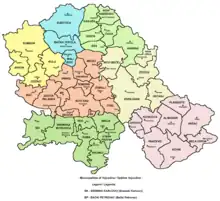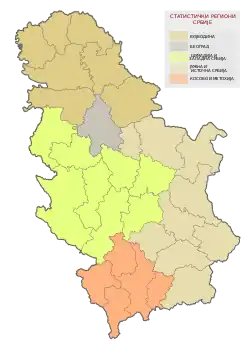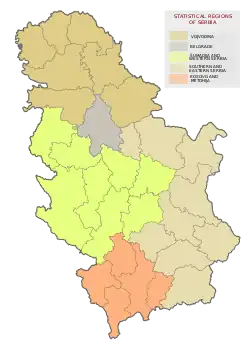Topola
| |
|---|---|
Town and municipality | |
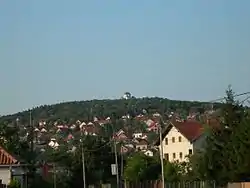 Topola with Oplenac at its hilltop | |
.svg.png.webp) Flag 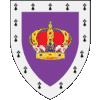 Coat of arms | |
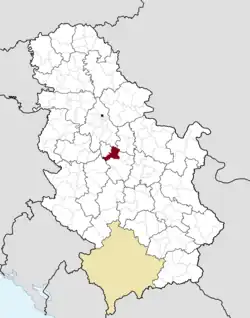 Location of the municipality of Topola within Serbia | |
| Country | |
| Region | Šumadija and Western Serbia |
| District | Šumadija |
| Settlements | 31 |
| Government | |
| • Mayor | Vladimir Radojković (SNS) |
| Area | |
| • Town | 5.91 km2 (2.28 sq mi) |
| • Municipality | 356 km2 (137 sq mi) |
| Elevation | 272 m (892 ft) |
| Population (2011 census)[2] | |
| • Town | 4,573 |
| • Town density | 770/km2 (2,000/sq mi) |
| • Municipality | 22,207 |
| • Municipality density | 62/km2 (160/sq mi) |
| Time zone | UTC+1 (CET) |
| • Summer (DST) | UTC+2 (CEST) |
| Postal code | 34310 |
| Area code | +381(0)34 |
| Car plates | TO |
| Website | www |
Topola (Serbian Cyrillic: Топола, pronounced [tɔpɔ̌la]) is a town and municipality located in the Šumadija District of central Serbia. It was the place where Karađorđe, a Serbian revolutionary, was chosen as the leader of the First Serbian Uprising against the Ottoman Empire in 1804. The local St. George Church is the burial place of the Ducal and Royal Family of Serbia and Yugoslavia (the Karađorđevićes).
The name Topola means poplar. Topola is famous for its yearly Oplenac vintage festival, attended by several thousand visitors each year.
Settlements
Aside from the town of Topola (5,422), the municipality includes the following settlements, according to 2002 census (population in brackets):
- Belosavci (1017)
- Blaznava (591)
- Božurnja (672)
- Donja Šatornja (800)
- Donja Trešnjevica (304)
- Donja Trnava (921)
- Gornja Šatornja (558)
- Gornja Trnava (1736)
- Gorovič (319)
- Guriševci (153)
- Jarmenovci (563)
- Jelenac (375)
- Junkovac (945)
- Kloka (1146)
- Krćevac (775)
- Lipovac (558)
- Manojlovci (144)
- Maskar (236)
- Natalinci (834)
- Ovsište (630)
- Pavlovac (70)
- Plaskovac (559)
- Rajkovac (189)
- Šume (595)
- Svetlić (417)
- Topola (village) (1363)
- Vinča (1176)
- Vojkovci (278)
- Žabare (1016)
- Zagorica (765)
History
The region was heavily settled after the Battle of Kosovo in 1389, seen in the many medieval cemeteries in villages of Topola. Despot Stefan Lazarević died and was buried in the nearby Crkvine hamlet. On June 20, 1459, the city of Rudnik fell to the Ottomans, situated south of Topola. A hamlet was named Despotovica in memory of the fallen Serbian Despotate. The region was further settled with the great migration of Serbs in the 17th century.
The town was established in 1781, by Vožd Karageorge, on the right of the Kamenica River. The town was destroyed during the First Serbian Uprising, when Kučuk-Alija ravaged the Šumadija region in 1804, also burning down Karageorge's house. The renovation began in 1805, when the town was renewed as a fortified city; Karageorge built a new mansion on the ruins of his previous house, and several buildings surrounding, they were all protected with palisades and peep holes, making Topola a strategic settlement. With the successful revolts, Topola gains a political importance. The Vožd further expanded the town, from 1808 to 1813 he built large walls, towers, konaks, a school, a church and many other buildings. Topola became the centre of Revolutionary Serbia, where Karageorge was seated.
In 1814, just when the city was finished, the Ottomans tackle the Uprising and Topola was seriously damaged, only ruins were left. Aleksandar Karađorđević, the son of Karageorge, renewed the city and settled people in a higher degree, streets were built with nicer buildings and shops. With the comeback of the House of Obrenović in 1858, Topola saw further development.
Demographics
| Year | Pop. | ±% p.a. |
|---|---|---|
| 1948 | 31,918 | — |
| 1953 | 32,561 | +0.40% |
| 1961 | 31,860 | −0.27% |
| 1971 | 30,322 | −0.49% |
| 1981 | 29,418 | −0.30% |
| 1991 | 27,579 | −0.64% |
| 2002 | 25,292 | −0.78% |
| 2011 | 22,329 | −1.37% |
| Source: [3] | ||
Economy
Topola is an agricultural area and farmers are producing fruit, vegetables and breeding cattle.
The following table gives a preview of total number of registered people employed in legal entities per their core activity (as of 2018):[4]
| Activity | Total |
|---|---|
| Agriculture, forestry and fishing | 84 |
| Mining and quarrying | 35 |
| Manufacturing | 809 |
| Electricity, gas, steam and air conditioning supply | 51 |
| Water supply; sewerage, waste management and remediation activities | 98 |
| Construction | 94 |
| Wholesale and retail trade, repair of motor vehicles and motorcycles | 664 |
| Transportation and storage | 174 |
| Accommodation and food services | 163 |
| Information and communication | 31 |
| Financial and insurance activities | 47 |
| Real estate activities | 2 |
| Professional, scientific and technical activities | 93 |
| Administrative and support service activities | 44 |
| Public administration and defense; compulsory social security | 223 |
| Education | 339 |
| Human health and social work activities | 142 |
| Arts, entertainment and recreation | 53 |
| Other service activities | 89 |
| Individual agricultural workers | 1,611 |
| Total | 4,849 |
Tourism
Topola has the preconditions necessary for development of a tourism industry. Historical and cultural monuments (Cultural Heritage of Serbia) exist: revolutionary and royal (Karageorge's town), ecclesiastical (St. George's church, Nikolje monasteries). It is a wine region (Oplenac), and a large hunting ground Kamenica.
Visitor attractions
- Oplenac, church and mausoleum of the Karađorđević (22 members), built 1910-2
- Nikolje Monastery, built in 1425 by Nikola Dorjenovic
- Karageorge's town, restored quarters of the 1810s revolutionary town
- Karageorge's church (church of Our Blessed Lady)
- Peter's house, King Peter's estate
- King's villa, Karađorđević estate
- Queen's villa, Karađorđević estate
- Winegrower's house, former royal wine cellar, now gallery
- Oplenac Wine region
- Aleksandrović wine cellar
- Kamenica Hunting ground, hunting region
- Oplenac Vintage (Oplenacka berba) annual folk festival second weekend of October
Gallery
.JPG.webp) The historic Post office building
The historic Post office building The Oplenac Royal Mausoleum
The Oplenac Royal Mausoleum
References
- ↑ "Municipalities of Serbia, 2006". Statistical Office of Serbia. Retrieved 2010-11-28.
- ↑ "2011 Census of Population, Households and Dwellings in the Republic of Serbia: Comparative Overview of the Number of Population in 1948, 1953, 1961, 1971, 1981, 1991, 2002 and 2011, Data by settlements" (PDF). Statistical Office of Republic Of Serbia, Belgrade. 2014. ISBN 978-86-6161-109-4. Retrieved 2014-06-27.
- ↑ "2011 Census of Population, Households and Dwellings in the Republic of Serbia" (PDF). stat.gov.rs. Statistical Office of the Republic of Serbia. Archived from the original (PDF) on 14 July 2014. Retrieved 11 January 2017.
- ↑ "MUNICIPALITIES AND REGIONS OF THE REPUBLIC OF SERBIA, 2019" (PDF). stat.gov.rs. Statistical Office of the Republic of Serbia. 25 December 2019. Retrieved 28 December 2019.
